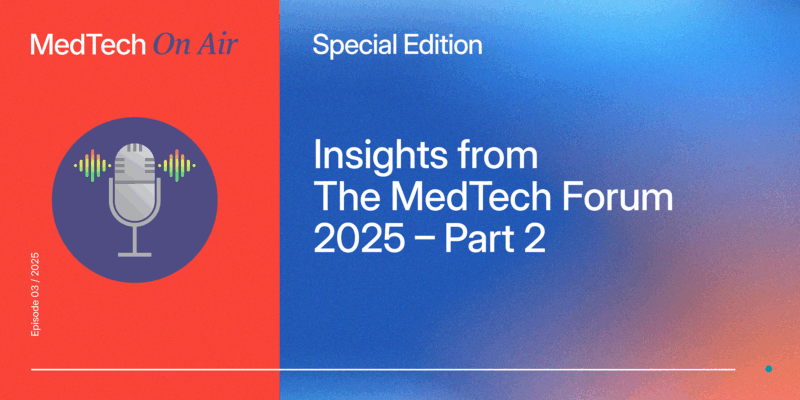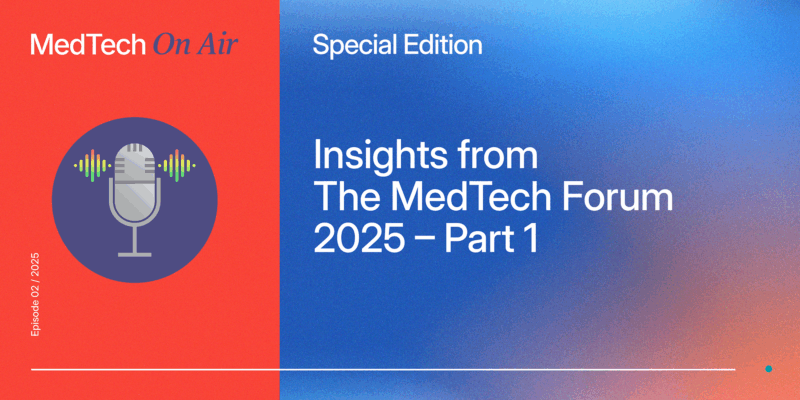
Patients and doctors express confidence in the medtech revolution

We are living in a time of rapid technological innovation, and history tells us such moments are often initially marked by suspicion and alarm. Trains, telephones and electricity were all met with anxiety or fear when first introduced to the public. These are normal human responses to change, and today we see them in public discourse around robotics, digital technologies and Artificial Intelligence (AI), to name a few.
There is one area, however, where technological innovation is widely welcomed and supported: healthcare. The results of a recent global survey (1) have revealed that both the public and healthcare professionals (HCPs) are overwhelmingly positive about how healthcare innovation will impact the future – even in otherwise divisive areas like data, robotics and AI.
The study, which surveyed over 12,000 adults and HCPs in 11 countries, including France, Germany, Italy and the UK, measured perceptions of the medical technology industry. The results indicate that people trust technology for key facets of their healthcare and believe it will continue to deliver benefits:
- 73% of the general population across France, Germany, Italy and the UK say they would be comfortable sharing their data if it meant that healthcare providers could create more personalised treatment plans tailored to each person’s unique needs
- 89% of European HCPs surveyed agreed that data and technology will support personalised treatment plans, and a further 92% believe they facilitate greater precision within surgery
- 73% of the general population note excitement about AI being used within the healthcare space and believe it’s an integral tool for improving innovation within medical technology. This support is even more pronounced among HCPs, with 94% advocating for the integration of AI technologies into the field.
These are promising results, particularly for someone like me who works in the field of digital healthcare solutions, because they reflect the impact these technologies already have.
AI, for example, is being used to analyse scans and flag the very early signs of potential cancer with extraordinary accuracy – important when populations are ageing, cancer prevalence is increasing, and trained radiologists are at a premium.
AI’s ability to analyse huge amounts of data is also transforming treatment planning and enabling life-saving surgeries guided by AI-powered mapping and robotic precision. Longer term, AI offers the potential to revolutionise personalised medicine, predictive care, and even reshape how we approach disease prevention and treatment.
Of course, we can only use data to create personalised treatment plans if people are willing to share them, and the high levels of trust revealed by the survey suggest overwhelmingly that they are. Trust in emerging technologies is not a given, and we in the medtech industry should never take this for granted. Without trust the uptake of innovations will stall, new technology pipelines will slow up and patients won’t benefit from healthcare advancements.
We must continue to champion the power of data and technology to transform healthcare while avoiding false or exaggerated claims that can erode trust. The ongoing support of both the public and HCPs is critical to our mission to develop the next generation of medtech solutions to tackle the world’s most pervasive and complex health challenges.
(1) Global Survey conducted by Morning Consult on behalf of Johnson & Johnson MedTech between August 8 and September 9, 2024 among 11,412 general population adults and 964 HCPs (including a mix of general surgeons, vision specialists, orthopaedic specialists, and cardiology specialists) in the following countries: Brazil, Chile, Colombia, France, Germany, Italy, Japan, Mexico, South Korea, the U.K. and the U.S. Results from the full survey have a margin of error of +/-3% for Gen Pop and between +/-8-10% for HCPs. European data are an aggregate of France, Germany, Italy and the UK










